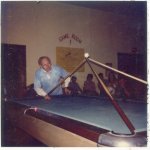Tonight as I was setting at a friends house waiting on the rest of our group to show up so we could head out of town to play a tourny .... I spotted a autographed photo of an American Pool Legend... His name is Eddie Felson aka Fast Eddie ... The real Eddie Felson, when most people think of Eddie Felson they vision the character in the movie "The Hustler ". Well the movie "The Hustler" was made about Eddie Felson... I asked my friend Danny how he got the picture and how Fast Eddie had come to autogragh it , In the picture he was a older gray haired man... He told me that before Eddie died ( 2/2/2001) he use to pass through our town often stopping at our local pool hall... Danny was lucky enough to get the picture of this legend and have him sign it ... It is hanging in his living room and he is very proud of it ... I myself got to wondering about Fast Eddie and how well the events in the movie portrayed Eddie Felson I did a search and came up with this on Eddie Felson an American Legend ... Thought I would share with all my fellow AZ'ers ... Also if any of you have copies of "The Hustler" and "The Color of Money" I would be interested in buying them from you please P.M me if you would part with them... If anyone has stories about Fast Eddie please post them I'm interested in finding out all I can about this legend... Thank you ...
Fast Eddie Felson -
Fast Eddie was born in Springfield, Missouri in 1931. He began playing pool at age nine. He attended school at Ava, Missouri, and he was graduated from high school in 1949. While he was still a teenager, he moved to Kansas City, Missouri, where he was tutored by the late, great Benny Allan, a six-time World Champion; and it was during that time that Fast Eddie became a money player.
In 1952 Fast Eddie joined the Navy and moved to California. After a tour of duty in the Navy, he continued playing pool throughout the country in the 1950's and 1960's. He has taught pocket billiards to hundreds of students, and although Fast Eddie was a money player, he won a number of tournaments, including the California 14.1 straight pool tournament in the 1950's.
It was when Fast Eddie was playing pool down South, in Kentucky, in the early 1950's that he became acquainted with a young man who had helped pay his way through college by working in a pool hall. That young man, Walter Tevis, wrote a book in 1959 entitled "The Hustler", of which a motion picture was made in 1961, starring Paul Newman, Jackie Gleason, Piper Laurie, and George C. Scott.
Being a money player, Fast Eddie would sometimes use assumed names. As well as Eddie Ezzell, Eddie Santee, Terry McKee, he used the name Eddie Felsen, and it was the later that the author changed the spelling to Felson and used in his novel. Fast Eddie's real name is Eddie Parker. According to Fast Eddie, only about thirty percent of the novel is based on fact. The remainder is fiction. For example, Fast Eddie had told Tevis about Rudolph Wanderone, also known as "New York Fats". Tevis changed the name to "Minnesota Fats" in his novel. Fast Eddie also related a few of his own experiences while on the road, such as the finger breaking incident and the big money match with the wealthy Kentuckian, which was played in the Kentuckian's home. Tevis changed the events slightly. Instead of Fast Eddie getting his two thumbs broken, as depicted in the movie, in reality his right forefinger was broken during the incident. The big money match with the wealthy Kentuckian was described accurately, except the match was played close to Lexington, Kentucky, instead of in Louisville, Kentucky as suggested in the movie. And Fast Eddie and his stakehorse (financial backer) won $30,000, instead of $12,000 as depicted in the novel and in the movie. The error was that Fast Eddie's percentage of the $30,000 was $12,000, his stakehorse received the remaining $18,000. The famous pool hall "Bensinger's" was changed to "Bennington's" in the novel and to "Ames" in the motion picture.
Fast Eddie attended Missouri University and the University of Tennessee for one year each. He has had many newspaper and magazine articles written about him; he has made television commercials; he has been on television talk shows; and he had his own television shows, "Shooting Stars with Fast Eddie" and "The Fast Eddie Show".
In 1980, he set a yet unbroken record by pocketing twenty-two balls in one legal stroke (the old record of twenty-one balls was, reportedly, set by Paul Gerni). In 1982, Fast Eddie toured Europe for the Department of Defense. During that tour, he performed in West Germany, Greece, Italy, and Spain. In 1987, he formed a partnership with a large Japanese company for the purpose of creating an instructional video tape; he spent nine days in Japan performing exhibitions and creating the video tape. He is the author of a pocket billiards workbook entitled, "What You've Always Wanted To Know About Pocket Billiards, But Were Afraid To Ask".
The workbook has been used by colleges and universities as an instructional tool. The workbook and an earlier video tape by him was in the possession of actor, Paul Newman, before filming "The Color of Money". Fast Eddie received a letter of thanks from the actor and from the casting director, Gretchen Rennels, before filming began.
Because his real identity was kept secret by himself and by the author, Walter Tevis, in 1987, a newspaper reporter asked Fast Eddie if he would consent to take a polygraph test to prove or to disprove his claim to have inspired Walter Tevis to write "The Hustler". In September of that year, a lie detector test was administered to Fast Eddie. The results proved that, indeed, Fast Eddie had told the truth and that his claims are accurate and truthful.
Since coming out of retirement in 1980, Fast Eddie performs more than two-hundred shows per year, and he has recently completed a novel himself, which is scheduled for publication soon.
As reported by a newspaper reporter, Fast Eddie is, indeed, "One of the last of a vanishing breed".


